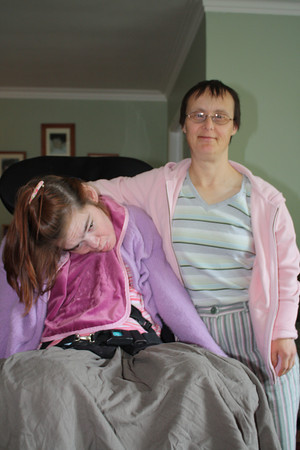L’Arche: Relationship, Transformation and Sign
Liska Stefko, a Confirmed Member of L’Arche Daybreak, delivered this homily on Friday evening, May 21, 2010 at Dayspring. Liska was recently ordained as a Deacon in the Anglican Church.
In tonight’s reading about the Pentecost, we hear about a lot of people from all over the world, gathered in one place, miraculously learning to speak another language. I admire people who can speak a lot of languages. I don’t mean just two languages: I mean 3 or 4 or 5 languages. I studied French as an undergrad, and I even went to France. I took classes about the formation of the European Union, about economics and art history and music history. I learned to speak French pretty well: the greatest compliment was when someone couldn’t immediately guess from my accent that I was American. Mostly I went to school, hung out in cafés with some other Americans and Swedes and Brits, but I didn’t really do anything of serious emotional import.
Then I went to Italy, to live at L’Arche for a year. I hadn’t really studied Italian before I went. I figured I’d pick it up along the way. At first, I didn’t know a lot of words in Italian. But my comprehension was pretty good. They’re actually 2 different kinds of brain functions. So, often I could understand what other people were saying, but it was hard to respond, because it took me too long to come up with the right words to answer. And because I didn’t say very much, people assumed I didn’t understand.It’s a strange thing to have people talk about you, in front of you, without including you in the conversation. I don’t know if any of you have had this experience, but it’s pretty humbling. I’m sure we all have some good stories. Even the simplest of things becomes very hard: going to the bank, asking for directions, even introducing yourself. Like I thought I was saying “Hello, my name is Liska.” But to Italians, it sounded like I was saying, “Hello, my name is Fishbone.”
Then there were the communication books. I lived with Silvia, a great friend of my heart, who was 12 years old. She went every day to a special school. Now Silvia didn’t know her parents, so really, the L’Arche community was her family. As assistants in her home, we took that responsibility very seriously. We wanted Silvia’s teachers to know how much, and how well, she was loved at home. So we took great care in dressing her beautifully, sending carefully prepared lunches, and writing extensive notes in her communication book.
How I labored over that book: I sat with an Italian-English dictionary in hand, learning idiomatic expressions and practicing my conjugation in complex verb tenses like the conditional and the subjunctive: “If Silvia were sick tomorrow, perhaps she could go to the doctor.” I asked questions of other assistants. I was lucky if there was a native Italian speaker there. And if not, the rest of us (Polish, German, French, American) would pool our resources to make our best guess. And yet. Despite my best efforts, I still remember a parent-teacher conference when I went to meet with Silvia’s teachers at school. I asked them if they felt that communication between home and school was going well. They said, oh yes, your communication book–we love reading what you write in the communication book: it makes us laugh. I could feel my face turning red, and I stammered: Oh, I’m glad it makes you happy. Sensing my embarrassment, they rushed to apologize: Oh no, we don’t mean that your writing makes us laugh…it’s just that you write like you speak, and that makes us laugh.
I felt misunderstood and inadequate a lot of the time in those first months. But at the same time, something else was happening. Day by day, I felt more and more at home at L’Arche, as I lived more deeply into the rhythms of bath time, meal time, prayer time, and bed time with the people I lived with. When I was with Silvia and Armando and Lucia and Paolo, I usually felt quite understood. Welcomed. Accepted. Affirmed. And it had very little to do with the words that were coming out of my mouth, or theirs for that matter. They did not speak with words. But all spoke with their eyes, their hands, their touch, their presence, their heart. They said: I’m here for you…I appreciate you…You are loved. All through the power of the Spirit, not through spoken words.
L’Arche is the place where I really started to be able to become aware of the working of the Spirit, in my own life, and in the lives of those around me. Not through some intellectual or verbal skill, but through expression, instinct, body language, and “sighs too deep for words.” Maybe the work of the Spirit isn’t about perfecting our intellectual abilities…but rather, expanding the possibilities of language, to include language of the heart, of the soul, of the body. These barely noticeable gestures require deep listening and gentleness to receive. They require us to expand our openness to hear, our willingness to stretch, and our patience in being present to one another. The more time I spent at L’Arche, the more I began to feel that the real miracle of Pentecost is learning to perceive and hear and understand a language that is not your own.
There’s a lot we could say about that first Pentecost, but one thing is quite clear: the miracle brought about by the Spirit is one of breaking through communication barriers. God’s message somehow breaks through to people who could not hear it before. Whether the miracle happens in the voice of the speaker or the ears of the hearer doesn’t matter: it is a miracle, something that could not have happened if God’s Holy Spirit had not intervened and allowed something new to happen. Jesus said in tonight’s Gospel that he is sending the Advocate, the Spirit of Truth, to testify on his behalf, and that we also are to testify. This is the task of the Spirit and our task, too.
I remember a time that Elisabeth Ridder and I were giving a retreat talk to some students on a Wednesday morning. We went back and forth as Elisabeth talked about her friendship with Tracy, and their life together at Corner House. Now Elisabeth’s talks about Tracy had a certain pattern. She’d start off by saying that
Tracy was her friend, that they lived together, that she helped Tracy with her coat and her shoes, that they like hanging out, just relaxing. Usually when I’d ask her, “Does Tracy talk with words?” she’d say no. And we’d go on to explain that Tracy communicated with her facial expression, smiling to say yes, and frowning to say no.
But there was that one day I asked Elisabeth: Does Tracy talk with words?
And she surprised me, saying: Little bit, not too much.
I said, Oh really, what does Tracy say to you?
Elisabeth: She said she loves me.
Curious, I asked: Does she say anything else?
Elisabeth: She says thank you, all the time.
I said but how do you know that if Tracy doesn’t talk with words?
She pointed to her head and smiled: “Just smart.”
You might say this was a little Pentecost event. The Spirit was at work through both Tracy and Elisabeth. Tracy was empowered to convey the workings of her heart, and Elisabeth was empowered to hear what Tracy had to say, and to testify in the Spirit of Truth.
Every day at L’Arche–at home, at work–every day at L’Arche is an opportunity to celebrate Pentecost. To gather together in one place, to receive the power of the Holy Spirit, to speak and to understand languages we didn’t know we knew. Some days it goes a little more smoothly than others. Some days it doesn’t seem to work very well at all. We know that communicating well in community can take a lot of work! But when it does happen it is miraculous, because there are so many barriers to genuine communication. The work of the Spirit is the work of relationship.
Every day at L’Arche is an opportunity to celebrate that the Spirit is found around and beyond words, in “sighs too deep for words,” moving through creation, giving us life and energy, imagination and courage. Whatever our mobility or ability, we are bearers of the Spirit that transforms all things: mind, body, spirit, and all creation. The work of the Spirit is the work of transformation.
Every day at L’Arche is an opportunity to celebrate that we are members of a community of prophets, empowered to announce the outpouring of the Spirit upon all people: young and old, rich and poor, men and women. We know that announcing God’s presence, in and beyond our community, is work that belongs to all who receive the Spirit, both then and now. The work of the Spirit is the work of sign.
This is our mission in L’Arche: relationship, transformation, and sign. May the Spirit of God guide us to be a sign of hope to our broken world. Amen.
© 2024 Copyright L'Arche Daybreak
WordPress Website Support by IDL Web Inc




